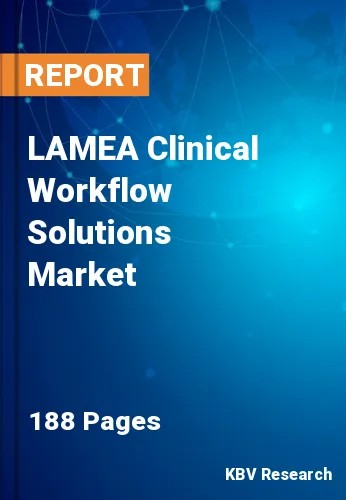The Latin America, Middle East and Africa Clinical Workflow Solutions Market would witness market growth of 15.2% CAGR during the forecast period (2023-2030).
Businesses are struggling to manage the quickly growing data sources as their client bases grow, and they explore new markets and geographical regions. With the advent of big data technology, businesses have begun to recognize the benefits of making investments in big data technologies, like clinical workflow solutions, and fully leveraging big data.
Due to the increased demand for home healthcare, service providers have been implementing novel technologies and software to raise the caliber of their services. The expanding demand for value-based care models as well as increased provider-payer cooperation, will be the primary drivers of clinical workflow management systems adoption in long-term care facilities. Utilizing features that enhance patient care, care coordination, and the decrease of adverse drug events (ADEs), clinically sound treatment is delivered. These operations will most likely grow in size over time.
According to the World Health Organization (WHO), 62.8% of men and 59.8% of women in Latin America's adult population were overweight or obese in 2016. Obesity, a risk factor for nonalcoholic fatty liver disease (NAFLD) and closely associated with persistent, low-grade inflammation, is linked to poverty. Moreover, coronary heart disease (CHD) is becoming a serious problem in most countries in the Arabian Middle East. For example, CHD accounts for 18–40% of all fatalities in Iraq, Jordan, and Syria. Some primary causes of diabetes include obesity, poor diet, hypertension, smoking, and a lack of physical activity. In addition, efforts to improve healthcare quality, population growth, the implementation of positive government initiatives, and rising public awareness of the advantages of clinical workflow solutions are all contributing to the growth of this regional market.
The Brazil market dominated the LAMEA Clinical Workflow Solutions Market by Country in 2022 and would continue to be a dominant market till 2030; thereby, achieving a market value of $415.8 million by 2030. The Argentina market is registering a CAGR of 15.8% during (2023 - 2030). Additionally, The UAE market would showcase a CAGR of 14.9% during (2023 - 2030).
Based on Solutions Type, the market is segmented into Data Integration Solutions (EMR Integration Solutions and Medical Image Integration Solutions), Real-time Communication Solutions (Nurse Call Alert Systems and Unified Communication Solutions), Care Collaboration Solutions (Medication Administration Solutions, Perinatal Care Management Solutions, Rounding Solutions and Others), Workflow Automation Solutions (Patient Flow Management Solutions and Nursing & Staff Scheduling Solutions) and Enterprise Reporting & Analytics Solutions. Based on End-Use, the market is segmented into Hospitals, Long-term Care Facilities and Ambulatory Care Centers. Based on countries, the market is segmented into Brazil, Argentina, UAE, Saudi Arabia, South Africa, Nigeria, and Rest of LAMEA.
Free Valuable Insights: The Worldwide Clinical Workflow Solutions Market is Projected to reach USD 23.8 Billion by 2030, at a CAGR of 12.3%
The market research report covers the analysis of key stakeholders of the market. Key companies profiled in the report include Veradigm, Inc., Cerner Corporation, NEXTGEN HEALTHCARE, INC., McKesson Corporation, Koninklijke Philips N.V., Cisco Systems, Inc., Getinge AB, Vocera Communications, Inc. (Stryker Corporation), Spok, Inc. (Spok Holdings, Inc.) and Ametek, Inc.
By Solutions Type
By End-Use
By Country
Our team of dedicated experts can provide you with attractive expansion opportunities for your business.

